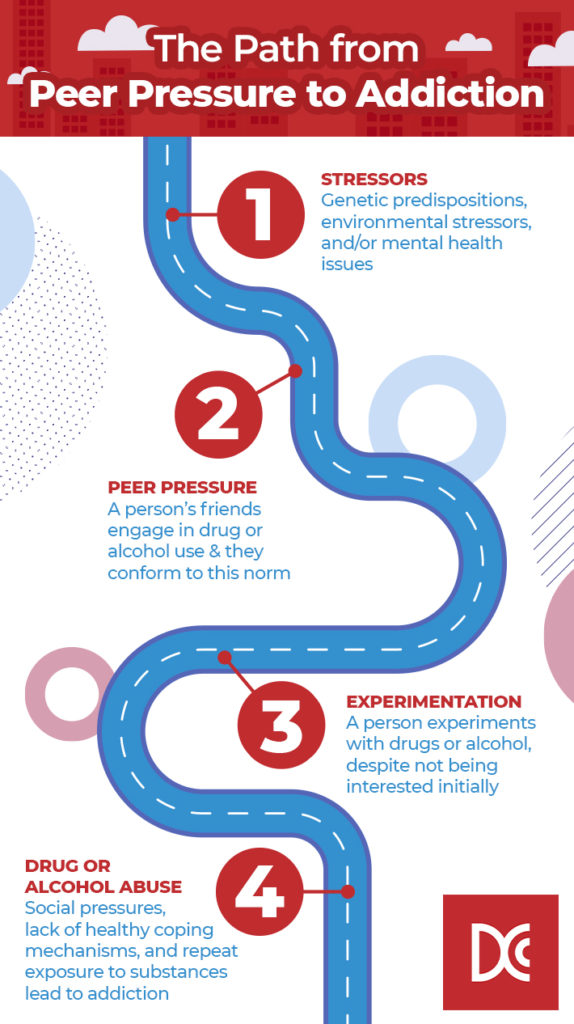As we navigate growing up, building friendships, and finding our place in social circles, encounters with peer pressure are all too common. These moments present us with choices that might go against our personal beliefs and values, particularly when it comes to using substances like drugs and alcohol.
While peer pressure is often associated with the teenage years, it can affect people of all ages. When we yearn to fit in and seek validation from a specific group, peer pressure to use drugs or alcohol can set off a harmful pattern—a cycle of substance abuse and addiction that can affect anyone, regardless of their age.
By embracing open conversations and fostering acceptance, we can empower ourselves and others to make choices that align with our true selves, helping us avoid the pitfalls of peer pressure and addiction’s effects on loved ones and personal mental health.
Understanding Peer Pressure
Peer pressure refers to the subtle or overt influence that our friends or social group can exert on us to adopt certain beliefs, values, or behaviours. This influence can manifest as direct persuasion, subtle cues, or even implicit expectations within our social circle.
As social beings, we often naturally seek acceptance and validation from those around us. This innate need to belong can make us susceptible to the influence of our peers as we strive to fit in and avoid feelings of exclusion or isolation.
While peer pressure is often given a negative connotation, it can affect us in negative and positive ways. Positive peer pressure can inspire us to pursue healthy habits, while negative peer pressure can lead us down paths that may be detrimental to our well-being.
Sources of Peer Pressure
Peer pressure can occur in different domains of our lives, including academics, hobbies, fashion, and even risky behaviours like substance abuse. In these situations, the pressure to align with the behaviours and attitudes of our peers can override our own judgment and personal values.
Some common sources of peer pressure include:
- Social media & online communities
- Friends & peers
- School environments
- Media & advertising
- Romantic relationships

Who Can Be Affected by Peer Pressure?
The risk of peer pressure is not limited to any particular group—it can affect anyone, but there are certain groups of people who may be more vulnerable to it.
Some groups who may be more vulnerable to peer pressure include:
- Adolescents and teens
- Individuals who lack a strong sense of self-esteem or self-confidence
- Those who have a limited support system or lack positive role models in their lives
- Individuals who experience social isolation or a sense of exclusion
Peer pressure’s effects on teenagers can make teens and young adults particularly more inclined to engage in what may be considered risky behaviour when their peers are watching them.
Peer Pressure & Substance Abuse
The connection between peer pressure and substance abuse is one that cannot be ignored. Substance abuse often finds its roots in the influence of a person’s social circle.
When individuals are surrounded by friends who engage in drug or alcohol use, there is a strong tendency to conform to these behaviours. The pressure to participate in such activities can be overwhelming, leading individuals to experiment with drugs or drinking, even if they initially have no interest in doing so.
However, it’s essential to recognize that substance abuse is not solely a result of peer pressure. Other factors that can play a role in addiction include genetics, family history, mental health issues, and societal influences. Nevertheless, peer pressure can act as a catalyst, pushing individuals toward experimentation and eventually leading to a cycle of substance abuse.
Strategies to Avoid Peer Pressure
When confronted with the challenges of peer pressure, there are strategies you can use to resist negative influences. These range from building self-awareness and confidence to planning ahead and intentionally avoiding situations where you might feel pressured to do something.
Whether you are a parent trying to help your child avoid peer pressure, a teen looking for help, or an adult experiencing pressure from others, the following strategies can provide a path toward avoiding peer pressure and behaviour that could cause harm to yourself or others.
Develop a Strong Sense of Self-Awareness
Take the time to reflect on what is important to you and what you stand for. When you have a clear sense of self, it can become easier to make choices that align with your authentic self.
Surround Yourself with Positive Influences
Seek out friends and peers who share similar values and support your goals. This can help create an environment that fosters positive decision-making.
Practice Assertiveness Skills
Practice saying “no” firmly and calmly when faced with situations that go against your values or put your well-being at risk. Remember that you have the right to make your own choices and set boundaries.
Plan Ahead & Be Prepared
Anticipate situations where peer pressure may arise, such as parties or social gatherings. Plan ahead by deciding how you will respond if faced with pressure to engage in behaviours you are uncomfortable with.
Learn to Say “No” Without Explanation
You are not obligated to justify your reasons for avoiding potentially harmful behaviour. Practice saying “no” without feeling the need to provide an explanation.
Remember, avoiding peer pressure is an ongoing process that takes time and practice. Be patient and compassionate with yourself as you navigate these challenges.
How Does Addiction Start?
Addiction often emerges from a variety of factors. It is not a simple matter of weak willpower or moral failing. Instead, it’s a complex interplay of various elements that can lead individuals down a troubling path.
Genetics can play a role in addiction susceptibility, as some individuals may have a higher predisposition due to their genetic makeup, but genetics alone won’t determine whether someone will experience addiction.
Environmental factors, such as exposure to drugs or alcohol, peer influence, and stressors, can influence the development of addiction. Early exposure to substances can alter neurochemical pathways and increase a person’s vulnerability to addiction, especially during critical periods of brain development. Furthermore, social pressures or a lack of healthy coping mechanisms can contribute to seeking solace in substances.
Personal circumstances, such as trauma, mental health issues, or a lack of social support, can also fuel the onset of addiction. Substance use may initially serve as a means to escape pain, numb emotions, or cope with life’s challenges. Unfortunately, this temporary relief can develop into a harmful dependency, perpetuating the cycle of addiction.

Getting Help for Addiction Issues
It’s essential to approach addiction with empathy and understanding, recognizing that anyone can be affected. By reducing the stigma associated with addiction, we can create a safe space for open dialogue and encourage individuals to seek help without judgment.
At the Calgary Dream Centre, we offer resources to help those struggling with addiction move forward. If you or a loved one is struggling with addiction or you simply want to learn more, let’s talk. Reach out to us today.



